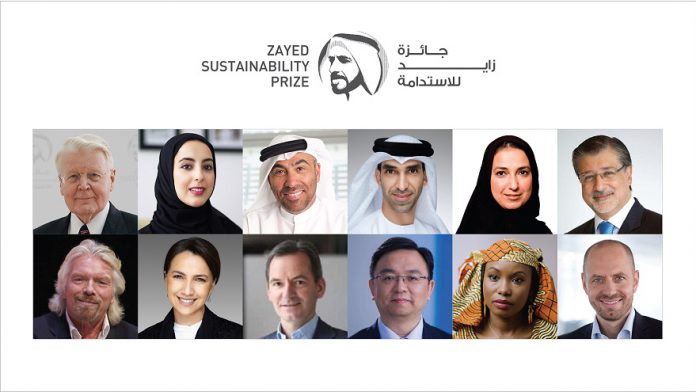The Zayed Sustainability Prize, the UAE’s pioneering global award for recognising excellence in sustainability, held its Jury meeting to elect winners for its current 2023 cycle, who will be announced during the Prize’s Awards Ceremony at the 2023 Abu Dhabi Sustainability Week (ADSW), this January.
A total of 30 finalists were confirmed and are now in competition for the 10 awards, across the five categories of Health, Food, Energy, Water, and Global High Schools. This year, the Prize received a record 4,538 applications, marking a 13% increase in entries compared to the previous cycle, while attracting submissions from 152 countries.
The Prize Jury, comprising former heads of state, UAE government ministers,and international business figures, met in Abu Dhabi in October to review the shortlisted submissions identified by the Prize’s Selection Committee.
Remarking on the announcement of the finalists, H.E. Dr. Sultan Ahmed Al Jaber, UAE Minister of Industry and Advanced Technology and Director General of the Zayed Sustainability Prize, said: “The late Sheikh Zayed bin Sultan Al Nahyan instilled in the UAE a commitment to inclusive sustainable and humanitarian development, and the Zayed Sustainability Prize continues to honour his legacy by turning this commitment into action. For the past 14 years, the Prize has accelerated the deployment of practical yet sustainable solutions that have positively transformed the lives of over 370 million people.”
“The Zayed Sustainability Prize has played an important role in supporting the UAE’s vision to drive inclusive climate action. The Prize will continue to amplify the UAE’s track record of supporting sustainable innovation across the world and driving progress toward empowering entities and schools who are contributing to global development,” he added.
Many of this year’s finalists proposed sustainable solutions that tackle environmental issues while also empowering local community members byunlocking their entrepreneurial potential. Many of those solutions leverage next generation technologies such as Artificial Intelligence (AI) and the Internet of Things (IoT) to drive impact.
The Chair of the Jury and former President of the Republic of Iceland, H.E. Ólafur Ragnar Grímsson, added: “The diverse range of innovationsdemonstrated in this year’s applications, including inspiring projects envisioned by the youth, reflects the Prize’s continuous ability to bring out the world’s sustainability pioneers by offering them a unique platform for driving transformational change.”
Health finalists focused on providing specialised medical care to remote communities.
The ‘Health’ category finalists are
Food finalists focused on transforming small farmers into entrepreneurs with improved agricultural productivity, either through innovative business models or advanced technologies.
The ‘Food’ finalists are:
Energy finalists focused on extending clean energy access to vulnerable communities while also introducing new business models that promote agender-inclusive clean energy sector and generate socioeconomic opportunities.
The ‘Energy’ category finalists are:
Water finalists focused on affordable solutions to make safe drinking water and sanitation more accessible in last-mile communities.
The ‘Water’ category finalists are:
The Global High Schools’ finalists presented project-based, student-led sustainability solutions, with finalists divided into 6 regions. The regional finalists include:
The Americas: Centro Etnoeducativo Integral Rural Nuestra Señora del Carmen (Colombia), Escuela Técnica Nro.3 Maria Sanchez de Thompson (Argentina), and Fundacion Bios Terrae – ICAM Ubate (Colombia).
Europe & Central Asia: ES Kreativno pero (Serbia), Northfleet TechnologyCollege (United Kingdom), and Romain-Rolland Gymnasium (Germany).
Middle East & North Africa: Gifted Students School (Iraq), JSS Private School (UAE), and Obour STEM School (Egypt).
Sub-Saharan Africa: Cheshire High School (Nigeria), Mary Mount Secondary School (Kenya), and UWC East Africa – Arusha Campus (Tanzania).
South Asia: Dhaka Residential Model College (Bangladesh), Kopila Valley School (Nepal), and Obhizatrik School (Bangladesh).
East Asia & Pacific: Bohol Wisdom School (The Philippines), Kamil Muslim College (Fiji), and Sangam Sadhu Kuppuswamy Memorial College (Fiji).
In the Health, Food, Energy, and Water categories, each winner receives US$600,000. The Global High Schools category has six winners, representing six world regions, with each winner receiving up to US$100,000. Since its launch in 2008, the US$3 million Prize has, directly and indirectly, transformed the lives of over 370 million people across 150 countries. Today, the Prize remains a catalyst for addressing the world’s most pressing issues as it continues to drive and deliver long-term impact to various communities around the world.
Boilerplate
The Zayed Sustainability Prize is the UAE’s pioneering global award in sustainability and a tribute to the legacy of the late founding father of the UAE, Sheikh Zayed bin Sultan Al Nahyan. Established in 2008, the Zayed Sustainability Prize aims to drive sustainable development and humanitarian action by recognising and rewarding small and medium-sized enterprises, nonprofit organisations, and high schools that are delivering impactful, innovative and inspiring solutions in the categories of Health, Food, Energy, Water and Global High Schools.
Through its 96 winners, the Prize has positively impacted the lives of 370 million people around the world.
*Source: AETOSWire










